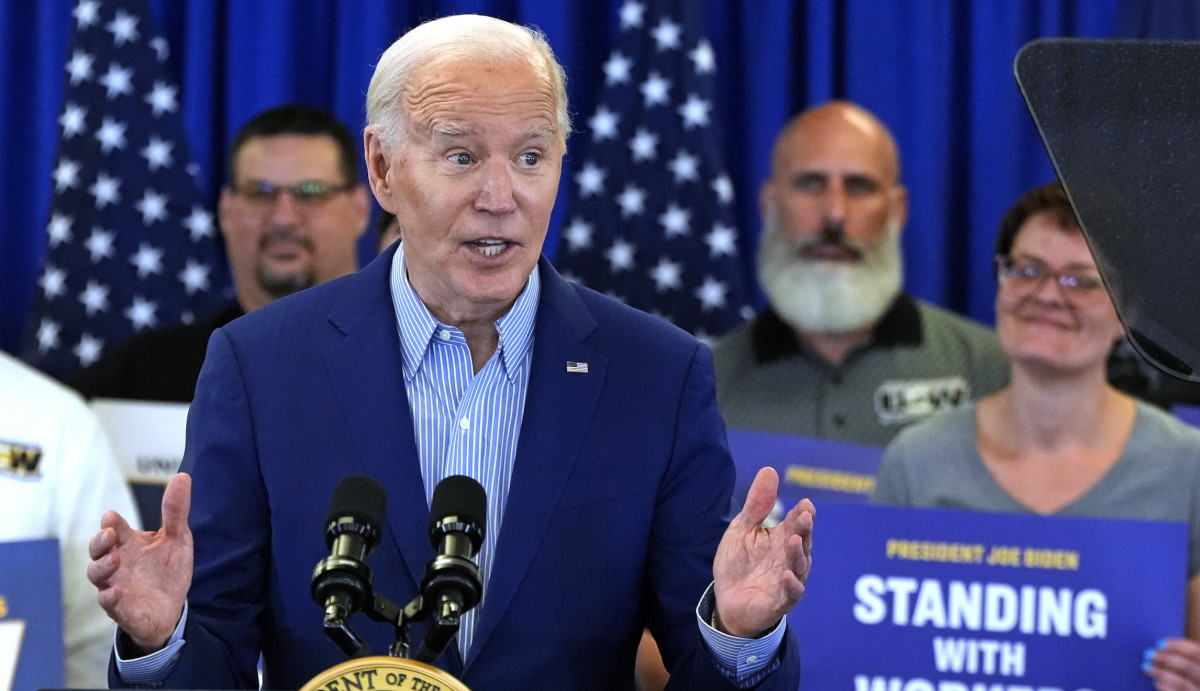

President Joe Biden and presumptive GOP nominee Donald Trump are now working to one-up each other with various tariff proposals, despite both political parties enthusiastically backing free trade just a few years ago.
The latest came Wednesday, when Biden proposed tripling the import tariff on Chinese steel and aluminum, subject to an investigation by U.S. trade authorities, from 7.5% to 25%.
“Because Chinese steel companies produce a lot more steel than China needs, it ends up dumping the extra steel into the global markets at unfairly low prices,” Biden told a group of union workers in Pittsburgh.
“Chinese steel companies don’t need to worry about making a profit, because the Chinese government is subsidizing them so heavily,” he added. “They’re not competing, they’re cheating. They’re cheating. And we’ve seen the damage here in America.”
With the candidates virtually tied in the latest Pennsylvania polling, Biden may be hoping to neutralize any advantage Trump would have with voters concerned about protecting American manufacturing.
But Team Trump argues that Biden is leading from behind, first by keeping most of Trump’s China tariffs in place, then by coming out against the sale of U.S. Steel to a Japanese firm three months after Trump did, and now by proposing his own tariffs after Trump has been talking about the issue for years.
If that argument sticks, Biden runs the risk of coming off as an imposter of sorts, and voters in key states like Pennsylvania may want to go for the original version.
“This is a demographic that was taken by President Trump from the Democrats, and I think it’s an effort by the Democrats in an election year to get that demographic back,” Andrew Hale, a trade policy analyst at the Heritage Foundation, said. “Biden is using a lot of the same language that President Trump has used.”
The states of Ohio and Pennsylvania lost more than 14,000 steelworkers after China began flooding the market, according to the president.
But the Trump campaign was quick to call Biden out, saying he’s either a hypocrite, a copycat, or both.
“Since taking office, Joe Biden has caved to China and left American workers behind,” Republican National Committee Chairman Michael Whatley said. “Now, after four years of failure, he’s finally following President Trump’s lead on tariffs. Americans deserve leadership, not lip service.”
Biden said during his 2020 campaign that he would end Trump’s China tariffs because they hurt consumers.
“He thinks his tariffs are being paid by China,” Biden told an audience in Iowa in 2019. “Any beginning econ student at Iowa or Iowa State could tell you that the American people are paying his tariffs. The cashiers at Target see what’s going on — they know more about economics than Trump.”
But now, with Trump and Biden both fixated on Rust Belt manufacturing workers in the swing states of Michigan, Wisconsin, and Pennsylvania, tariffs have gone bipartisan.
“Clearly, the neoliberal era is done,” University of Massachusetts Amherst professor Gerald Friedman said. “The idea that the whole world would be tied together by trade, and the world would get along because they’d be trading together — that is over.”
Tariffs were infamously hiked via the Smoot-Hawley Tariff Act of 1930, which today is widely blamed for exacerbating the worst effects of the Great Depression. Yet Friedman says it was only in the Reagan era of the 1980s that a true free trade consensus emerged in the U.S., and he worries about the effects of rising trade tensions.
“Free trade is generally a good thing for everybody, and it’s unfortunate if it goes away,” he said.
CLICK HERE TO READ MORE FROM THE WASHINGTON EXAMINER
Biden still says his approach to trade is fairer and better than Trump’s. He points to proposals Trump has floated for a 10% across-the-board tariff as damaging to consumers. An analysis from a left-of-center think tank found that such a policy would be akin to a $1,500 annual tax increase for the typical household, a figure Biden cited in Pittsburgh.
“Trump simply doesn’t get it,” he said.
Hale agrees that a broad tariff on enemies and allies alike would have negative effects akin to Smoot-Hawley, though he does not think the Trump administration would actually implement such a sweeping policy based on the ideas of its leading economic advisers.